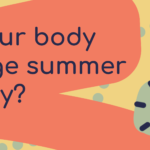How does summer make you feel about your body image?
If you said stressed, anxious, or sad – you’re not alone. The Mental Health Foundation found that 37% of teenagers felt upset (and 31% felt ashamed) in relation to their body image.
We know that young people who are dissatisfied with their bodies are more likely to experience disordered eating or an eating disorder (though it’s important to remember that eating disorders are complex mental illnesses that are often about more than body image alone).
And we also know that being dissatisfied with your body is a risk factor for other mental health problems like depression and anxiety too.

.
Summer pressures
Summer can bring lots of extra pressures around body image.
As the weather changes, lots of people swap bulky jumpers and long trousers for shorts, dresses, or vest tops. This can feel stressful if you’re worried about body hair; skin with scars, stretch marks, or pigmentation; or the shape or size of your body.
Summer also brings a lot of adverts (both on and off social media) that imply that a certain type of body – usually white, thin, toned, and in-line with gender stereotypes – is better.
And sometimes, even jokes about weight loss or ‘summer bodies’ can leave us feeling unhappy with the skin we’re in.
We’ve dug into the research and put together four top tips to help you improve your relationship with your body this summer.
Tip one: seek out diverse representation
We all know that a lot of the bodies we see aren’t representative of reality. In a world of filters, angles, and Photoshop, not even models and influencers have the bodies we’re used to seeing portrayed as the ideal.
And we also know that the people and algorithms that decide on the content we see favour certain types of bodies – usually those that are white, thin, cisgender, and non-disabled.
But knowing this isn’t always enough to stop it affecting the way we see ourselves and our own bodies. We need to take action and diversify the bodies we see.
No one’s saying you have to abandon all of your favourite reality TV shows or unfollow every influencer (though it is a good idea to be aware of how things affect you and step away from anything that’s making you feel worse).
It can be helpful to make sure that, overall, you’re consuming content that features a range of bodies (as well as other things you care about, whether that’s dogs, gaming, or travel). It can act as a reminder that you don’t need to look a particular way to appreciate your body, to be loved, and to achieve success.
People with different shaped bodies, big stomachs, acne, scars, and visible impairments are out there, celebrating their bodies and living their best lives – and that’s possible for you too.
Oh, and also? You can hide unhelpful ads on Insta by tapping the three dots in the top right hand corner.
Tip two: focus on what you enjoy doing
Now your social media and TV viewing are more diverse, it’s time to switch off and get stuck into something else for a bit of a break.
When you’re feeling down about your body, it can be easy to get sucked into an ever-tightening spiral of negative thoughts. Switching your focus to an activity you enjoy can be an important distraction and reminder of what life’s really about.
People perceive and interact with the world in different ways, but ultimately, your body is the vehicle through which you get to enjoy life and its experiences. What happens if you gently move your focus away from how your body looks to the ways your body allows you to navigate the world?
Tip three: recognise positives that have nothing to do with bodies
Most of us don’t choose who we spend time with based on the way they look. If you think about the reasons that you enjoy spending time with people, the size, shape, or look of their bodies probably doesn’t make the list.
Despite this, so many of the compliments we give to the people we care most about are centred around physical appearance.
How would you actually describe the important people in your life? Maybe they’re funny, kind, caring, adventurous, or trustworthy. You could try to make it a habit to tell people about the positive things they say and do, rather than the way they look. You could even share this piece with them so they can give it a go too – how would they describe you?
Tip four: check the story you tell about your body
We can be quick to get frustrated with our bodies. Before we know it, we’ve started telling ourselves what we’d like to change, grow, shrink or remove. But would you make those sorts of comments about a friend’s body?
Of course, it’s not as simple as ‘deciding to love your body’, especially for people who have experienced structural issues like racism, transphobia, and ableism. But if you notice yourself comparing your body to others’ or getting sucked into thoughts about the way your body looks, you can try to disrupt the story you’re telling.
It can be helpful to come up with reminders that you can repeat to yourself when things in your head start to feel overwhelming, like:
‘People’s bodies aren’t the most interesting or important thing about them – and that includes my body too’
‘I’m trying not to compare myself to others, because everyone’s bodies are unique and equally valuable’
‘I’m choosing to step away from these thoughts about my body – I have more important things to do with my time, energy, and attention’
You could even display them around your mirror, or by the front door, to give you a little boost.
If you’re struggling with your body image and want to talk about it, you can text NATTER to 85258 to text with a trained volunteer. You can find other sources of immediate help under Get help now, as well as information about digital mental health resources and mental health services in North West London.






















































